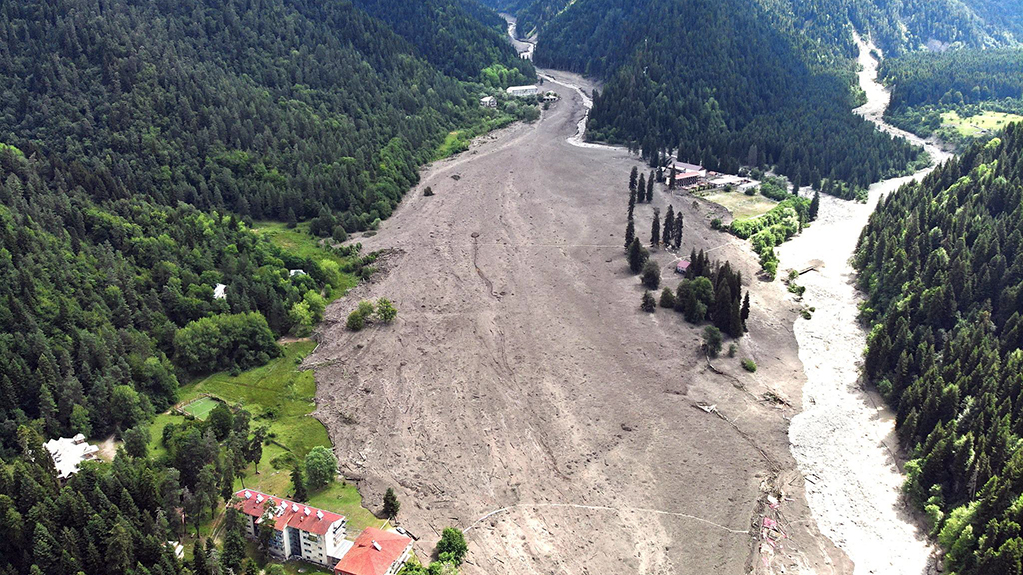According to the final report of the specialists of the National Environment Agency, it was practically impossible to predict the exact time of the disaster that occurred on August 3, 2023, in Racha, Shovi resort, and the arrangement of the alarm system could not have been effective in preventing the consequences.
News
The document published today, on February 16, states that on August 3, 2023, at 15 hours and 10 minutes, a catastrophic glacial landslide occurred in the Bubistskali River valley, which was caused by the coincidence of hydrometeorological and geological events. The role of human influence in the developed geodynamic processes is unequivocally excluded, and it is only related to natural factors.
According to the report, based on the field research carried out in the Bubistskali valley, it was established that a rock mass collapsed to the west of the Bubi glacier, which came into dynamic contact with the glacier, deformed and collapsed a certain part of it. This led to the overflow of water in the interglacial cracks and also occurred as a result of the friction of solid material of the rock mass on the surface of the glacier. The fastest, most intense melting of the glacier occurred, after which the resulting flow began to move at high speed in the valley bed.
The document repeats the initial assessment made by the agency on August 6, according to which there was no long-term stagnation of water on Bubistskali neither before the development of the disaster nor during the development of the disaster.
“The average speed of the landslide mass was 18-24 m/s. From the zone of creation and activation of the disaster, the so-called Shovi torrent should have reached the area of the cottages in 7.5-10 minutes,” the report says.
According to the final conclusion of the specialists, within the territory of Georgia, the Bubistskali river valley on the southern slope of the Caucasus was one of the rarities before the disaster of August 3, 2023, where there was no significant flow of mudflow during the last 100 years, “unless we count the separate floods that developed in the river bed.”
“The formation of a natural event of a complex nature that developed instantly and coincided on August 3, 2023, depended on many factors. It is practically impossible to predict the exact time of conception and activation of this type of event all over the world.”
“Establishing an alarm system for a natural disaster of such a complex genesis, taking into account the rapid development of the natural disaster and the short distance from its conception zone to the settlement, could not have been effective in preventing the consequences.”
According to specialists, the volume of solid material that came into the dynamic in the Bubistskali valley, including glacier fragments and woody material of torn trees and vegetation, amounted to no less than 4 million cubic meters. Out of this, up to 1 million cubic meters were accumulated in the territory of Shovi resort. The report says, about 1.5 million cubic meters of solid material have accumulated at the base of the rocky avalanche area, on the surface of the Bubi glacier, in the headwaters of the Bubistskali River and its tributaries, which is why the danger remains today.
The final report of the National Environment Agency includes the following recommendations:
"Considering the hydromorphological parameters of the river valley, it is not recommended to carry out any kind of capital protective measures in the area of the flood formation and transit zone in the Bubistskalii river valley.
In recent years, due to the increase in the frequency and intensity of glacial and geodynamic cascading events caused by climate change, natural hazards of various scales have persisted in the areas of the southern slopes of the Caucasus. Therefore, in order to assess the degree of existing dangers, it is necessary to continue complex studies. It is not allowed to set up any kind of new infrastructure and operate the existing buildings in the area of the disaster (26 ha) in the Bubistskali Valley;
Movement rules should be developed, and relevant warning signs should be set up for the Bubisskali River gorge and the Shovi resort disaster area.
To minimize human casualties and economic losses resulting from dangers in glacial valleys, it is necessary to assess the threats and risks to settlements and infrastructure in the lower reaches of glacial valleys in Georgia (risk zoning). This includes identifying settlements in the risk zone and preparing relevant initial recommendations.
In general, it is technically impossible to carry out capital protective measures on processes of a similar scale in similar types of valleys. Currently, the best and most effective way to protect people and infrastructure is through spatial planning of the territory.”
On August 3, 2023, 33 people died as a result of a natural disaster that occurred at the Shovi resort. A large part of the resort was destroyed.















